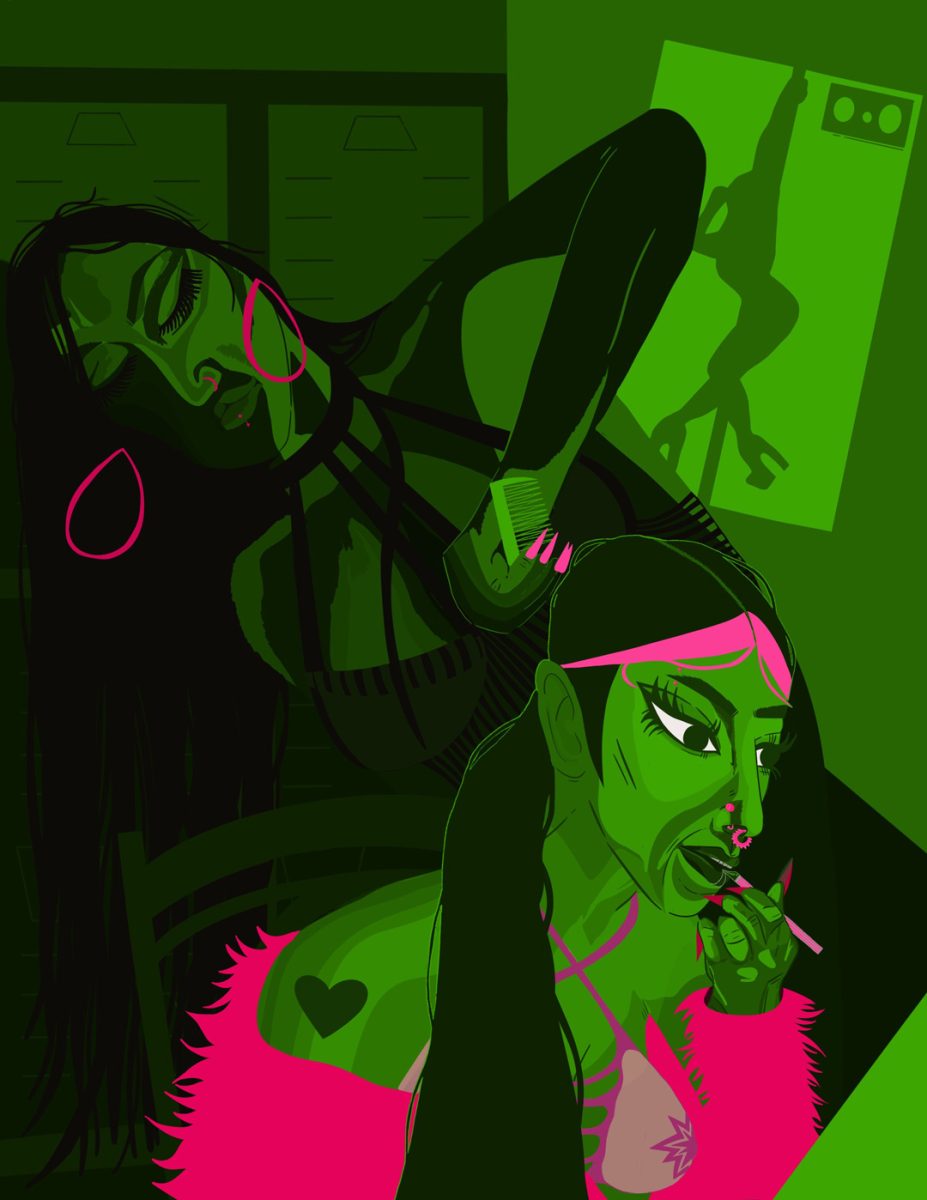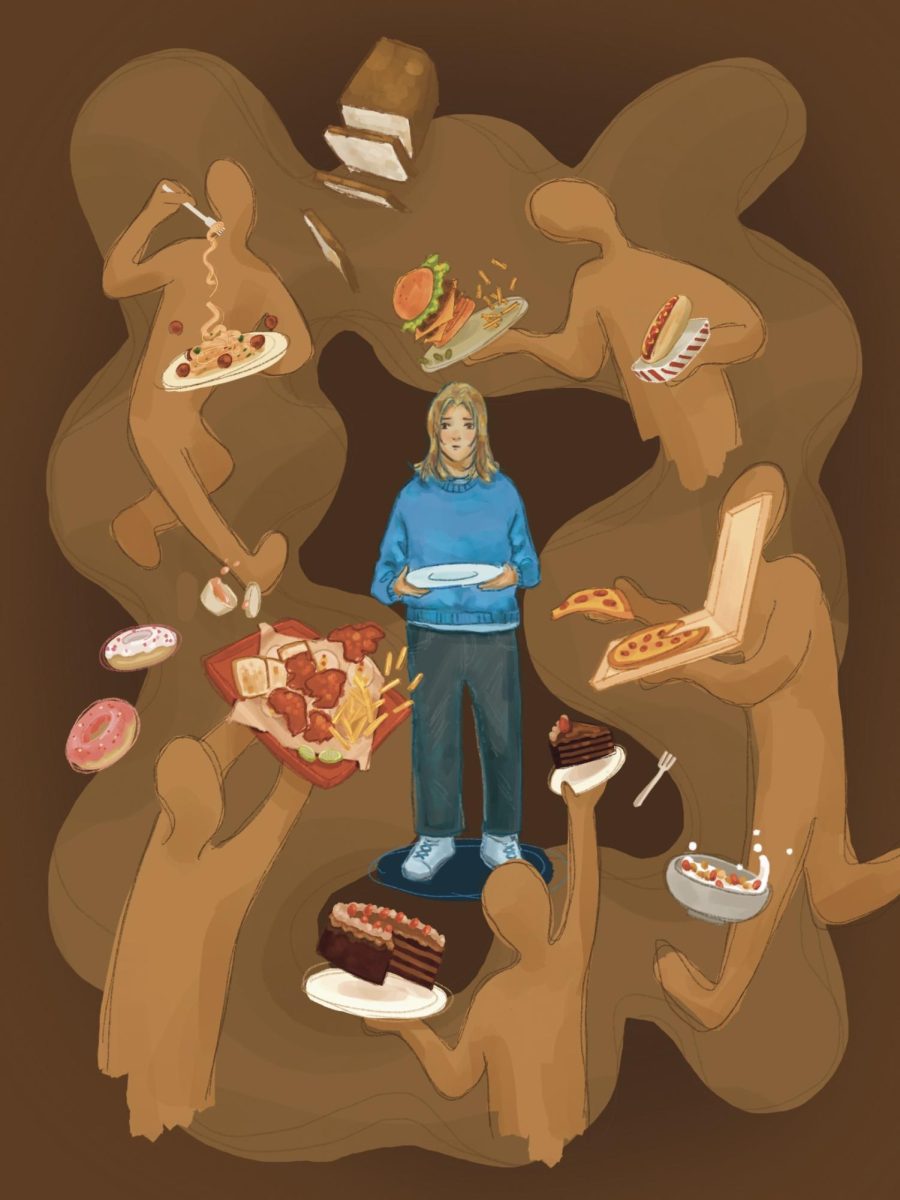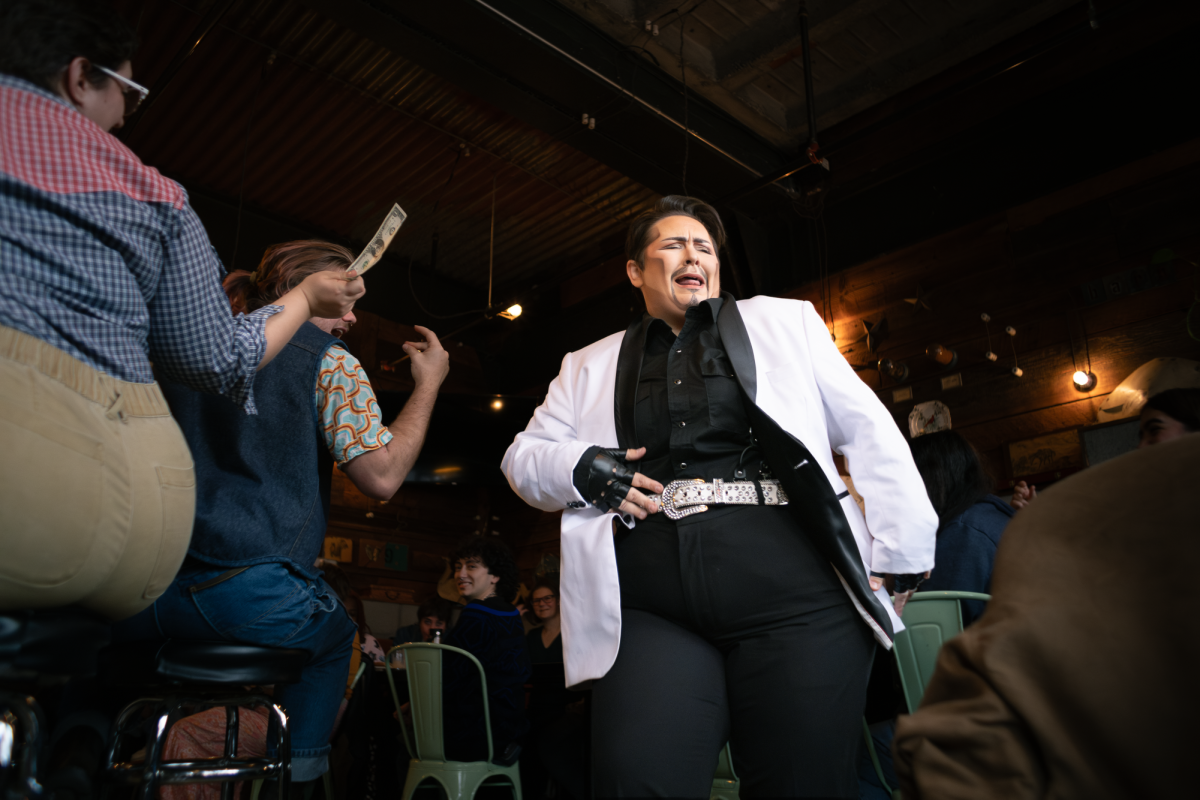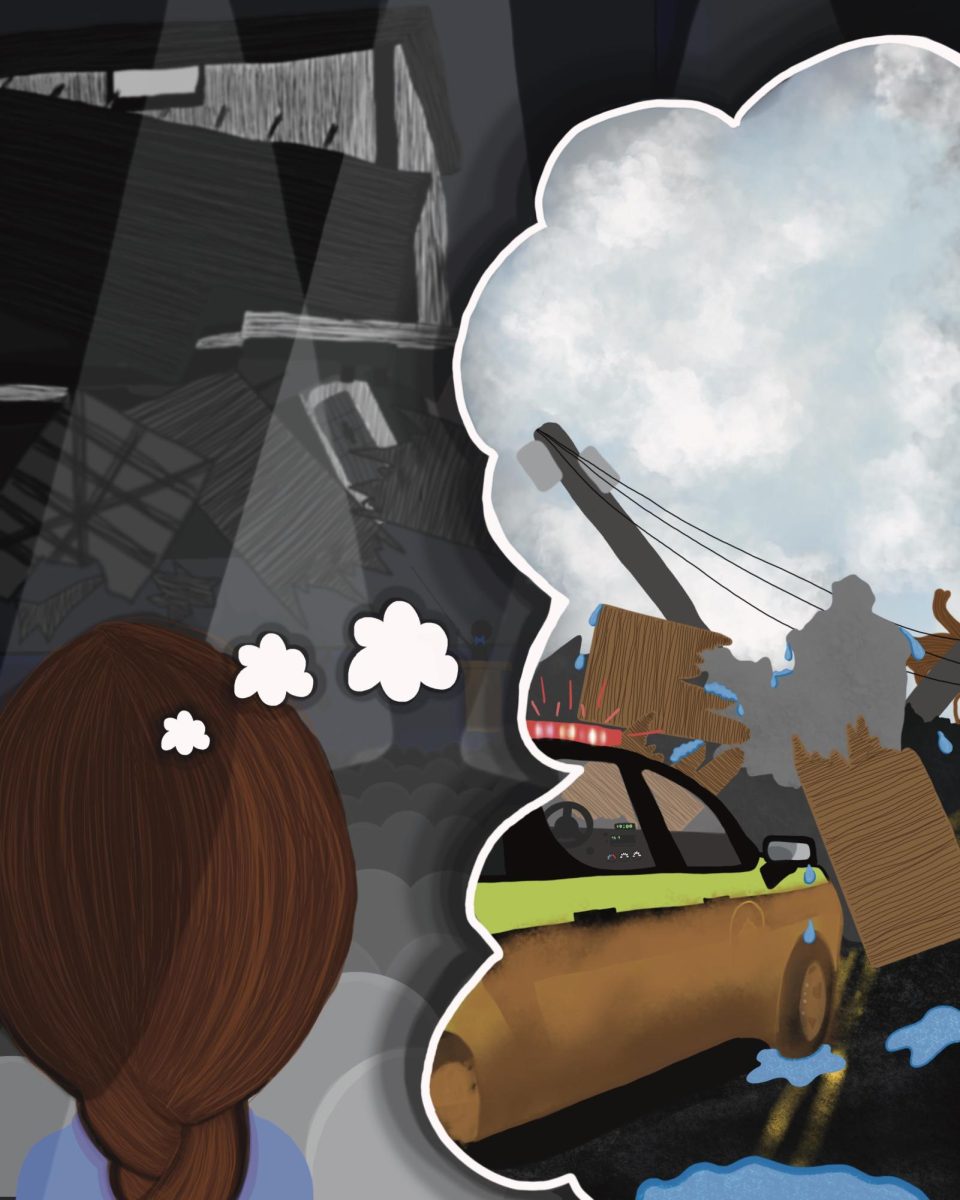Ambientneon lights color an ill-lit room as stray 5s and 20s circulate — a venue where eight-inch heels and poles co-exist. While customers order drinks and observe the stage, others are led to discrete corners following brief cash transactions. Alluring employees confidently direct paying patrons to private cubicles. While the space appears to be appointed with rolling cameras, the status of strippers’ safety is not a guarantee.
There’s a late-night nature to this work that in the morning may be forgotten about and erased.
Despite being a $7.6 billion national industry, strippers in Oregon and California are concerned with their employment conditions, including wage theft, the safety of poles and stages in venues, benefits and harassment, according to Actors’ Equity Association, also referred to as Equity. Like several other sectors, the COVID-19 pandemic highlighted the systemic flaws burdening strippers, prompting a reexamination of their workplace and triggering a resurgence of unionization. The Economic Policy Institute cited the pandemic as illuminating union vitality and the power of collective action to institute reform.
In concert with these efforts, one area of employment is no exception — Portland strippers.
Portland has been cited as the mecca of adult entertainment, earning this label by having more strip clubs per capita than any other state. For every 11,826 residents, there’s a strip club — outranking cities such as Miami and Las Vegas.
In fall 2022, dancers at the Star Garden in Los Angeles voted on whether to unionize, followed by an election at the Magic Tavern in Portland in September 2023. All 33 dancers at the two clubs voted yes. As the first unionized clubs in the country, strippers reclaimed their power and ability to advocate for themselves, backed by union resources. Equity, a union that represents more than 51,000 actors and stage managers, now represents strippers too.
Situated on Northwest 24th Avenue and Nicolai Street in Portland, the dancers at Magic Tavern spent months organizing before the vote, from striking demonstrations in April to picketing the club in June and demanding reform. Picketers stood equipped with signs that read “strippers need safety now” and “strippers united will never be divided,” signaling solidarity and rebuking poor working conditions.
The dancers at Magic Tavern have a growing Instagram following, which dancers oversee and administrate. They cited intersectionality as a prism for illuminating how sexism, classism and racism impact people and shape experiences within social systems such as employment, health care, education, government and policy, displaying the complexity of their fight.
Since unionizing, Equity has outlined preferable terms that should be used and adopted by the mainstream to replace stigmatizing and inaccurate labels. Retiring the original terms such as exotic dancer and pole dancer is part of strippers standing up for their rights. Equity allows them to enroll with their stage name and occupation, which is either “stripper,” “dancer” or “sex worker” for those formally working in the sex trade.
Beyond derogatory labels, strippers have several fundamental grievances with their working conditions, including mandatory minimum wage violations. Reports of strippers not receiving pay and garnishing a fraction of their earnings to the owners of the governing clubs are prevalent across Oregon. Moreover, strippers don’t set their own prices with customers. Prices are determined by the club owners and management.
By virtue of being categorized as “independent contractors,” strippers have also been susceptible to on-the-spot firings. The National Labor Relations Board recognized the strippers at Magic Tavern didn’t have enough freedom to build their own work schedules and choose their clients –– the essential components of being an independent contractor –– yet the label persists. This risk, along with the reality of unstable income, has inclined some to pursue alternative gigs. Many opt to utilize an OnlyFans platform where they sell adult content to paying subscribers. Many dancers self-promote their OnlyFans network to stabilize their earning capacity –– a more apt example of independent contracting.
“It used to be a matter of some debate if strippers could unionize, not because of the nature of their work, but because of how they’re employed,” says Gabriela Geselowitz, project manager and senior writer at Equity. According to Equity, the employer at the Los Angeles club, Star Garden, tried to make the case dancers were independent contractors, and not employees, to hamper unionization efforts.
According to Equity, strippers have at times worked in unsafe environments, citing uneven flooring and unstable poles. A union contract, however, will ensure stronger protections for workers and will condemn bullying and harassment, which the dancers at Magic Tavern have encountered. “[Strippers] are considering what standards should apply to their workplace, from how security guards are assigned to how they can be assured of a properly installed pole on a safely constructed stage,” says Geselowitz.
Along with Equity, the Northwest Workers’ Justice Project (NWJP) in Portland has been a resource for strip club dancers. The nonprofit organization offers legal advice, representation and education to protect the dignity of workers considered as low-wage, immigrant or contingent. They have been working with dancers for around ten years, according to the project’s director and attorney Corinna Spencer-Scheurich.
Spencer-Scheurich spoke about the misclassification of strippers and how the Portland stripper strikes during the pandemic primed the efforts and conversations happening today.
Reflecting on the industry as a whole, Spencer-Scheurich says, “Strip clubs can’t operate without strippers.” However, unionizing may not compel the majority of dancers due to the classification as an employee impacting the level of control, be it perceived or actual, dancers have in their respective roles, says Spencer-Scheurich. She explained dancers may perceive unionizing as reducing their workplace flexibility and potentially making their jobs less lucrative.
Elle Stanger, also known as @stripperwriter on Instagram, has 14 years of stripping experience in Oregon and is a certified sex educator. While Stanger isn’t against the union movement, they clarified unionizing isn’t a one-size-fits-all solution and gave perspective to the argument of resisting formal employee status.
“Often the carrot is dangled that you will get benefits and healthcare and you’ll qualify for shit because you’re an employee now. But what they don’t tell you is that you still need to have a minimum number of hours to qualify,” Stanger says. Since the requirement for employee status can vary from 30 to 35 hours per week, some dancers just miss the cut-off.
Allegedly, strippers risk being left with less pay if owners distribute wages. As it stands now, dancers engage in mandatory tip-outs where a fraction of their shift earnings garnish other workers’ salaries at the venue. Dancers at some clubs are expected to pay for their station, which Stanger compared to renting a workstation at a hair salon. Shifts can range anywhere from four to nine hours, and a lap dance sits at $20 to $50 or $100 for three songs being a popular deal some venues boast.
Of course, there are still downsides. “The stage fees can be exorbitant and very extortionist, which is one reason why some strippers prefer to be employees,” Stanger says, proving just how complex such categorizations are.
Looking locally, the Eugene and Springfield area harbors three strip clubs, following the recent closure of one club named Bobbi’s in October 2023.
A dancer at Nile Gentlemen’s Club in Eugene, referred to by the stage name Bunny, was recently compelled to monetize her newfound fitness hobby, pole dancing, into stripping. Bunny, unlike other strippers, aligns with the independent contractor model as she has complete autonomy over her schedule. “I don’t feel like I’m working for someone else or wasting my time,” she says.
While she feels empowered by dancing and getting to work for herself, adversities inevitably exist. “Going home after borderline being assaulted [at work] and having to brush it off like it was nothing” is an intimidating part of the job, according to Bunny. She linked this to inebriated clients who devolve into aggressive behavior. While Bunny feels protected by the bouncers who surveil, “there’s only so much they can see to,” she says.
Despite the challenges, Bunny has no plans to leave the industry anytime soon and has aspirations to remain dancing in the coming years, hopeful of where this may take her.
While the efforts in Portland haven’t spread to Eugene or other Oregon towns, unionization on a club-by-club basis remains a possibility. Nevertheless, the union model doesn’t appeal to all strippers due to the myriad benefits and drawbacks of being labeled as an employee or an independent contractor, according to NWJP and Stanger. Even so, Equity predicts the organizing efforts seen at Magic Tavern may be the template for future strippers in the industry to follow suit.
Ethos Magazine contacted Magic Tavern’s owner by email and phone but did not receive a response. A statement released on the company’s Instagram account in August wrote, “Any further actions that hinder our business will be viewed as harassment and be vetted for its criminal intent or civil liability.”
Organizing efforts in Portland are nascent, making it premature to forecast a statewide unionization wave. Resources are in place for union representation as demand increases, according to Equity. Community resources and the unity of dancers in the industry are what uphold safety and ensure an inclusive and equitable work environment is attainable.
There’s optimism for improved working conditions anchored in stability for all strippers. Their voice is salient, and their work is here to stay. Adult entertainers are striving to transform and empower their work by building alliances with unions or leaning on community nonprofit resources. While unionizing may not suit every situation, safety should be a guarantee, regardless of whether strippers are employees or independent contractors. All people deserve a safe working environment.












![[Photo Courtesy of the Lara Family]
Ruben embraces his beloved childhood goat, Katrina.](https://ethos.dailyemerald.com/wp-content/uploads/2025/05/katrina-1-1060x1200.jpg)








